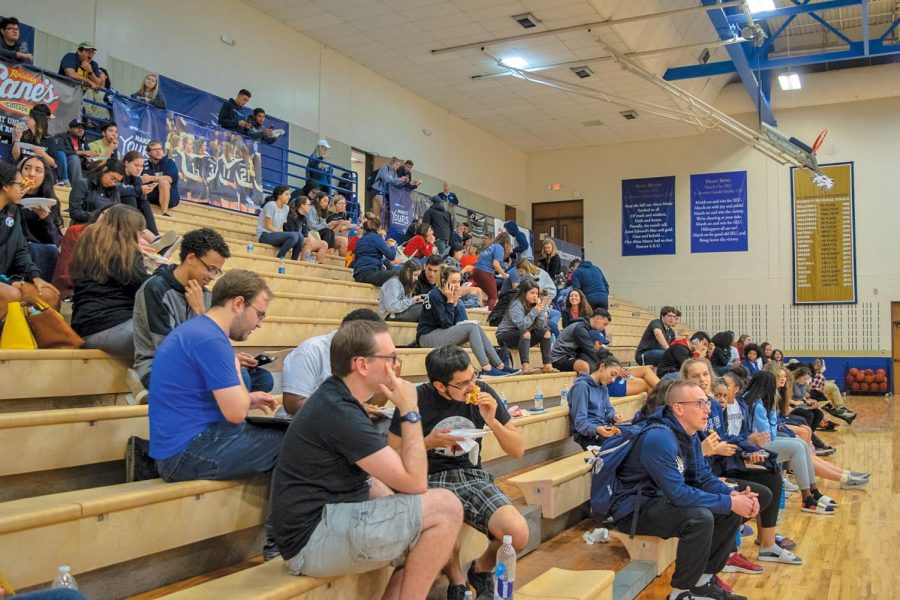OurView: Pavilions flooding has negative implications beyond property damage
Lauren Sanchez / Hilltop Views
Students gather in the RCC after being evacuated from the flooded Pavilions.
In times of crisis, communities either band together or fall apart. This all depends on how the community chooses to react to the situation. On Nov. 1 at approximately 7:30 p.m., the newly built Pavilions had a pipe unexpectedly burst and started flooding the apartments.
Many students have been displaced, have had their stuff stolen and have had to move into other residence halls as a result of this. Obviously, this been a very difficult situation for both students and faculty to work through, and many people just want to point fingers.
We can complain all we want about how the university should have done something to prevent this, but what’s done is done. What we need to do now is to look at what we can do in the aftermath of this situation. Let’s not try to ignore the slew of problems that are gonna follow this incident, both for the students and the university.
Aside from the obvious property damages, there are also some not being taken into account:
International, DACA and transgender students, all of whom own crucial documents to their person and ability to maneuver through the world. Papers that document one’s immigration status, student visas and gender identification, to name a few, and none of which are cheap to replace. It costs $495 to replace a DACA identification card.
As well as important documentation, there are still other things to worry about when it comes to damage, such as medication for students. Even though students were allowed to retrieve any necessary medicine, it still could have gotten damaged in the flood. How will the university take care of these?
Not to mention that students have reportedly had stuff stolen in the chaos surrounding students trying to retrieve essential items, and there just being a general lack of security over the past weekend.
Let’s not forget this disaster will determinate investment plans Administration had prior to the incident. Administration has already invested money into that plan, where are they going to go from here? This also calls into question something that is probably on everybody’s minds: will covering the cost of the damages end up raising tuition that has already been raised multiple times in the past?
The total cost for the 2017 – 2018 school year was $54,450, while the total cost for the current school year is a little over $60,000. It’s only going to get higher. The burst pipe doesn’t just affect the Pavilions residents, it affects the entire student body. On top of having to pay for damages of their apartments, Pavilions residents will have to deal with high tuition.
With higher tuition costs comes a lower rate of retention, something that the university has struggled with in the past, and will continue struggle with as their trust is even more fractured.
Those issues aside, what does the university plan on doing about these damages? Since the students are already suffering from emotional damages, there is no reason why they should have to pay for physical damages that are not their fault.
Despite the university’s efforts to drain the water from the affected wings, leakage from the affected rooms ended up leaking into previously unaffected rooms, leaving even more students with damaged items.
The university had the students fill out forms about items that might have been damaged or lost during the flood, but the amount that they are going to reimburse remains unclear.
Above all, the university now has students with some major trust issues on their hands. Students are worried, stressed and anxious about the entire situation.
For students suffering from mental issues after the flooding, the university has made counseling available for students to talk about the lingering anxiety over the situation.
Though the university is first and foremost a business and we are its customers, there should still be a bond on a personal level that shows that the school does care about bringing students back, and not just as a way to keep making money.
Without a trustworthy relationship, there is no way for the university to keep flourishing years down the line. Yes, students will still come back, but it will be hard to strive for the mission that St. Edward’s prides itself on.
The university has done a lot of good in terms of its resource programs that its provided for the Pavilions residents, and finding housing on campus for them rather than putting them in hotels is a good move on the university’s part.
However, more action needs to be taken to help students in this time of crisis, starting with replacing any important documents that may have been lost as a result of the flooding.
This includes legal documentation for any DACA students that may have been affected in the Pavilions or any other important legal forms people may have lost.
It’s also imperative that this university starts listening to its students. For a long time, students complained about issues with the Pavilions, and though some issues were resolved, bigger issues were ignored. Earlier this semester our newspaper published an article about the numerous problems in the Pavilions. Those claims were dismissed not only by other students, but by faculty members as well.
At the end of the day, we are a community of people who the administration is responsible for. Of course, they can’t answer every beck and call when we hear an argument through a thin wall, but when we notice something off about a building, it would be helpful to listen to us.
We don’t have all the answers. At the end of the day we’re just a couple of student journalists who are upset by all the emotional and physical turmoil these residents are being put through. Of course, we won’t be able to understand at all the nuance that goes into running a university, but listening to students rather than taking what we say with a grain of salt can help ensure we are in a safe and productive learning environment.
We are hoping our university administration will take this incident as a lesson so that no one will have to experience the difficulties the residents, the RAs and that the administration itself has had to go through.

Hi! My name is Sierra Rozen and I'm the Life and Arts editor. I'm a senior Communication major, with double minors in Journalism and Women's Studies. This...








![According to a 1993 archive from Congressional Quarterly Almanac, “[Judge] Ginsburg was known as a restrained and fair-minded judge who did her homework and then some.” She was “considered moderate to conservative on criminal issues and business law,” relatively progressive “on issues such as free speech, religious freedom and separation of church and states,” and more liberal on “civil rights and access to the courts.”](https://www.hilltopviewsonline.com/wp-content/uploads/2020/10/VP-4RBG_CC-by-WFULawSchool-475x317.jpg)
